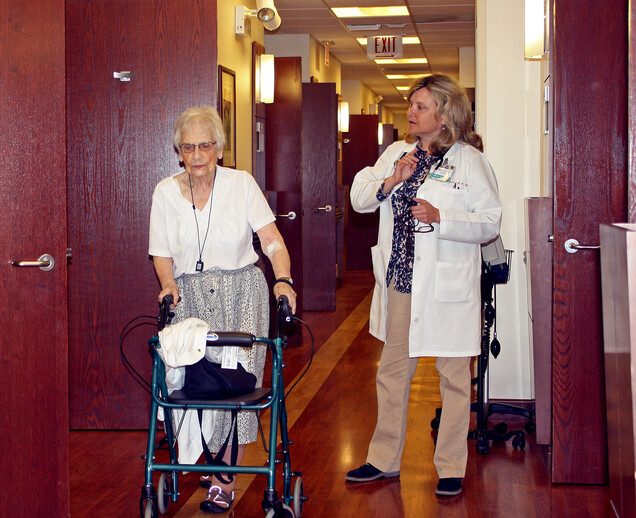- Adult Heart DiseaseDiseases of the arteries, valves, and aorta, as well as cardiac rhythm disturbances
- Pediatric and Congenital Heart DiseaseHeart abnormalities that are present at birth in children, as well as in adults
- Lung, Esophageal, and Other Chest DiseasesDiseases of the lung, esophagus, and chest wall
- ProceduresCommon surgical procedures of the heart, lungs, and esophagus
- Before, During, and After SurgeryHow to prepare for and recover from your surgery
March 27, 2018

Frailty is a term that many people understand intuitively, but this term has specific meaning when people are considering major surgery. Doctors think of frailty as a condition that makes patients more susceptible to the stresses related to surgery and interferes with a patient’s recovery from surgery.
Frailty is associated with higher costs for care, longer hospital stays, increased risks for complications, and a higher likelihood of being discharged to a nursing home or rehabilitation facility rather than home after major surgery.
How is frailty assessed?
Frailty is often associated with older age, but many older people are not at all frail, and some younger people can be frail. There are a number of methods of determining whether someone is frail. When I see someone who I think may be frail, my team performs an evaluation to help make that determination.
Frailty screening looks for these features:
- Recent weight loss
- Poor grip strength
- Being easily fatigued
- Having low levels of physical activity
- Having a slow walking speed

What if my patient appears to be frail?
If a patient of mine has three or more of these features, I often will ask a colleague who specializes in geriatrics to make a more formal and thorough evaluation, called a comprehensive geriatric assessment that examines:
- Nutrition
- Exercise levels
- Medications
- Memory and thinking ability
- Risks for falls at home
- Depression
- Chronic illnesses
- Family and community support
The results of the assessment help the health care team plan for a patient’s needs during and after hospitalization for major surgery.
Why is frailty such a concern?
The physical features that we think represent frailty are just the tip of the iceberg when considering everything that is going on with a frail patient. A number of underlying abnormalities likely exist that can have very important influences on the outcomes of major surgery. These include:
- Weak bones
- Low muscle mass
- Increased systemic inflammation
- Decreased immune function
- Loss of nutrients
- Changes in hormone levels
- Dementia
What can be done if a patient is frail but needs surgery?
In some situations, surgery does not have to be done immediately, and I can recommend interventions to improve my patient’s condition and hopefully make the operation safer. These interventions include improved nutrition, primarily through regular healthy meals and sometimes with the addition of protein supplements. In addition, I may suggest frequent exercise such as strength training, improving balance, and cardiovascular exercise for improved stamina.
Stopping smoking and having minimal alcohol intake are also essential elements in preoperative preparation. A 4-week effort usually produces remarkable improvements in a patient’s attitude regarding surgery and in their physical well-being.
What if a patient is too frail for surgery?
If I consider a patient to be too frail to have a safe operation, we usually discuss alternatives to surgery that are safer but that provide some benefit. For example, if a patient has lung cancer, alternative treatments could include radiation therapy, chemotherapy, or immunotherapy. For patients with heart valve disease, there are methods of replacing valves without surgery. Most patients are familiar with using stents to keep open the blood vessels that supply the heart muscle. All of these methods are frequently used in patients for whom surgery is thought to carry too much risk.
The opinions expressed in this article are those of the author and do not necessarily reflect the views of The Society of Thoracic Surgeons.

